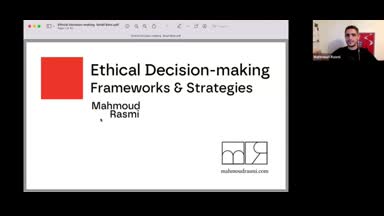A Pragmatic Guide to Business Ethics
 by
Mahmoud Rasmi
by
Mahmoud Rasmi
Have you ever wondered how cultivating certain habits could help you become more successful in your business endeavors?
...
Have you ever wondered how cultivating certain habits could help you become more successful in your business endeavors?
'Build in public,' 'create a product that serves people and solves their problems,' and 'give, give, give, then ask.' These are just a few of the suggestions you've likely encountered on social media as a creator or professional.
While they may seem like simple catchphrases, these principles are derived from the core of an ethical framework proposed by the ancient Greek philosopher Aristotle, known as virtue theory. It primarily focuses on cultivating a virtuous character to thrive in both professional and personal contexts.
We all possess a diverse array of ethical frameworks that act as our moral compass in our everyday lives. During this session, we will delve into three of these frameworks: virtue theory, consequentialism, and the theory of duty. You might not realize it, but we all employ these frameworks in various contexts, often unconsciously.
Throughout this session, we will explore how these ethical frameworks can be applied in a business context. This examination will encompass your interactions with clients, other businesses, suppliers, and your wider audience. By dissecting these ethical lenses, you'll gain some pragmatic insights into navigating the complexities of ethical decision-making in the business world.
Disagreements over ethical issues often arise from different individuals applying diverse ethical theories to analyze and support their arguments. The primary objective of this session is to equip you with fundamental ethical reasoning tools, enabling you to identify these distinctions and navigate potential conflicts more effectively. This can be applied both in personal dilemmas and in interactions with others.
Recording

Friday, November 17 2023
6:00 PM
on